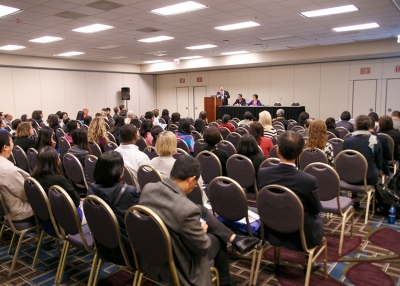Conference Presentations: NCLC 2018
Conference presentations at the 2018 National Chinese Language Conference, in Salt Lake City, Utah, included a full-day CELIN Educator Forum and five presentations on learning Chinese in the digital age, curriculum and instruction, engaging parents, developing teachers, and supporting international teachers.
CELIN Sessions
Experts in Chinese language education presented sessions on the following topics.
Curriculum and Instruction in Chinese Elementary Schools:
Strategies and Resources
Presenters: Meiching Chang, Betsy Hart, Rita Oleksak, Joy Kreeft Peyton
Presenters shared information and resources that teachers need for effective curriculum planning, instruction, and documentation of students' learning and described specific instructional strategies for engaging children in learning Chinese, based on the six STARTALK principles of effective instruction.
View or download this presentation
Learning Chinese in the Digital Age:
Educator Tools and Frameworks
Presenters: Ann Marie Gunter, Jiahang Li, Adam Ross, Joy Kreeft Peyton
We are living and learning in the Digital Age, and teachers need to know how to use available technologies effectively in instruction and how students can use them outside the classroom to continue learning. Presenters described three frameworks that can guide uses of technology in instruction and ways that they can be used to guide day-to-day classroom practices that build students' 21st century skills with digital tools.
View or download this presentation
View or download the corresponding CELIN Brief
Engaging Parents in the Journey of Chinese Language Learning
Presenters: Maquita Alexander, Sharon Huang, Joy Kreeft Peyton
Engaging parents in the language learning of their children is key to broadening the appeal of Chinese language programs and making them successful. Presenters described ways that we can support parents as they make decisions about and participate in their children's Chinese language education.
View or download "Engaging Parents in the Journey of Chinese Language Learning"
View or download "Ten Lessons Learned on Engaging Parents at a Mandarin Immersion School"
Developing Leadership Capacity in the Chinese Teaching Field:
A Discussion
Presenters: Duarte Silva and Shuhan Wang
The Chinese language field needs administrators and teacher leaders who can build and sustain effective programs focused on Chinese language, literacy, and culture and address issues related to program design, articulation, refinement, sustainability, and teacher preparation and development. Presenters described key components of teacher leadership development and capacity building and ways to build leaders in Chinese language and culture programs.
View or download this presentation
View or download the corresponding CELIN Brief
Guide to Supporting International Chinese Language Teachers in U.S. K–12 Programs
Presenters: Stacy Lyon and Shuhan Wang
Presenters described the need for international Chinese language teachers to meet the demand for teachers at all levels of education in the U.S. and support structures that must be in place for them to be successful in programs in which all teachers can thrive.
View or download this presentation
CELIN Educator Forum
At the 2018 National Chinese Language Conference, in Salt Lake City, Utah, CELIN held an all-day CELIN Educator Forum, the day before the official opening of the NCLC, on Development of Student and Teacher Programs in Chinese Immersion Education in the United States.
More than 60 participants attended the CELIN Educator Forum, including parent and student representatives, teachers, administrators, teacher developers, policymakers, researchers, and community members. Love Zubiller, a parent representative, and Alexandra Emily Koullick, a student representative, spoke about their perspectives and experiences of having Chinese as an important part of their lives.
National experts shared their insights and strategies on panel presentations on student programs and teacher capacity building. Roundtable discussions on a wide range of topics focused on these two areas. Meeting together by region, participants discussed what they could do together at local and regional levels. As we continue our efforts in this forefront, we will share information and strategies in the development of Chinese dual language immersion education in the United States.

